Team care
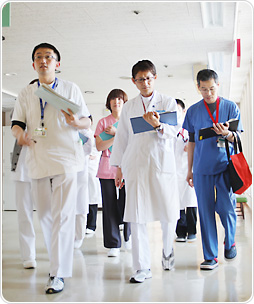 Aso Iizuka Hospital is special in that staff members are closely united across departments and jobs. Staff from various work fields form a team based on the condition of a patient, and offer care and support through discussion. The 44 departments at Aso Iizuka Hospital provide diagnosis and treatment, and we have a system whereby various support teams can join these processes in any department to ensure that each process produces better results more effectively. We also have teams comprised of members of different departments to help patients resume their former lives.
Aso Iizuka Hospital is special in that staff members are closely united across departments and jobs. Staff from various work fields form a team based on the condition of a patient, and offer care and support through discussion. The 44 departments at Aso Iizuka Hospital provide diagnosis and treatment, and we have a system whereby various support teams can join these processes in any department to ensure that each process produces better results more effectively. We also have teams comprised of members of different departments to help patients resume their former lives.
Many teams are involved in the care of a cancer patient. For example, the Palliative Care Team eases physical a nd psychological discomfort to ensure peaceful rest. NST (Nutrition Support Team) monitors the patient’s nutrition needs and offers personalized nutrition management. ICT (Infection Control Team) continuously monitors and investigates any infectious disease at the hospital. RST (Respiration Support Team) makes a round once a week to check if artificial respiration is being provided properly. Other team care is ongoing throughout the hospital to offer optimal care for patients, including a cancer board and daily joint conference of the Cardiology and Cardiovascular Surgery Departments.
Regional healthcare
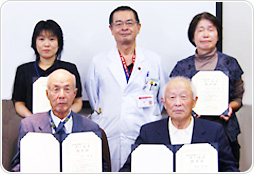 Aso Iizuka Hospital cares for patients as a regional
medical care support hospital, by working with other medical facilities in the region. Our headquarters for regional cooperation promotion combines units responsible for frontend and backend cooperation including collaboration in treatment, bed management,
and consultation on medical care, welfare and long-term care. It leads networking towards the creation of region-based total medical care.
Aso Iizuka Hospital cares for patients as a regional
medical care support hospital, by working with other medical facilities in the region. Our headquarters for regional cooperation promotion combines units responsible for frontend and backend cooperation including collaboration in treatment, bed management,
and consultation on medical care, welfare and long-term care. It leads networking towards the creation of region-based total medical care.
We also operate the Community Healthcare Supporter Program which aims to preserve and effectively utilize the finite medical resources of the region, together with the people of the area. This system appoints Community Healthcare Supporters, people who take the initiative in“ protecting their own health (disease prevention)” and “using medical facilities wisely (appropriate doctor visits)” and propagate this information to those around them. Since its establishment in March 2010, people from different age groups have endorsed and joined the system.
Cancer care
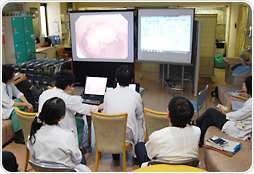 Having been designated as a key hospital for regional cancer care, Aso Iizuka Hospital offers multimodel care catering to each patient and led by multi-faceted teams that include rehabilitation, nutrition management, oral care and mental care. In 2013, the PET・SPECT Center was created as the first such facility in the Chikuho region, and has been utilized in diagnosis and treatment by various departments and in cancer screening. The Cancer Intensive Care Center houses a unit with 35 beds including 6 sterile beds, 15 reclining chairs for I.V. and the Outpatient Chemotherapy Room with a dedicated pharmacy. To further improve cancer care, we hold weekly cancer boards with physicians and other staff and discuss treatment plans for 5-10 patients.
Having been designated as a key hospital for regional cancer care, Aso Iizuka Hospital offers multimodel care catering to each patient and led by multi-faceted teams that include rehabilitation, nutrition management, oral care and mental care. In 2013, the PET・SPECT Center was created as the first such facility in the Chikuho region, and has been utilized in diagnosis and treatment by various departments and in cancer screening. The Cancer Intensive Care Center houses a unit with 35 beds including 6 sterile beds, 15 reclining chairs for I.V. and the Outpatient Chemotherapy Room with a dedicated pharmacy. To further improve cancer care, we hold weekly cancer boards with physicians and other staff and discuss treatment plans for 5-10 patients.
Perinatal care
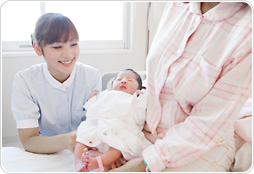 We are the only hospital in the Chikuho region to be designated as a Perinatal Medical Center, playing the key role in the perinatal care for the 420,000 residents in the region. Currently, the Pediatrics Inpatient Unit has 9 beds in NICU and 12 in GCU in addition to regular beds, and the Obstetrics Inpatient Unit offers 6 beds in MFICU plus regular beds. With fewer facilities handling deliveries in the Chikuho region, we saw a temporary increase in the number in annual deliveries. We now care for about 490 deliveries (Cesarean section about 37%) and offer 24-hour services for high-risk mothers brought in by ambulance and emergency surgeries. Neonatal Care has 21 beds including those in NICU and GCU, and dedicated physicians and nurses offer 24-hour care for infants. The 2012 record shows that Obstetrics Care had accepted 98.3% of the mothers transported by ambulance. Our Perinatal care will continue to support mothers and children in the region by strengthening cooperation with Neonatal Care.
We are the only hospital in the Chikuho region to be designated as a Perinatal Medical Center, playing the key role in the perinatal care for the 420,000 residents in the region. Currently, the Pediatrics Inpatient Unit has 9 beds in NICU and 12 in GCU in addition to regular beds, and the Obstetrics Inpatient Unit offers 6 beds in MFICU plus regular beds. With fewer facilities handling deliveries in the Chikuho region, we saw a temporary increase in the number in annual deliveries. We now care for about 490 deliveries (Cesarean section about 37%) and offer 24-hour services for high-risk mothers brought in by ambulance and emergency surgeries. Neonatal Care has 21 beds including those in NICU and GCU, and dedicated physicians and nurses offer 24-hour care for infants. The 2012 record shows that Obstetrics Care had accepted 98.3% of the mothers transported by ambulance. Our Perinatal care will continue to support mothers and children in the region by strengthening cooperation with Neonatal Care.
Emergency medical care
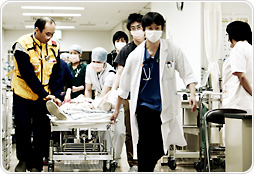 Aso Iizuka Hospital’s Emergency and Critical Care Center is the only emergency medical center serving the 420,000 people in the Chikuho region, with approximately 20 emergency transport cases per day. We treat mild to serious cases 24 hours a day, 365 days a year, to sustain emergency medical care in the Chikuho region. Since August 2010, we have employed ER-Aide, with the aim of minimizing strain, waste and unevenness in work, and created an easy-to-work-in environment by supplementing manpower and strengthening expertise through division of work. In addition, we also operate the only“ doctor car”in the Chikuho region. The“ doctor car” is dispatched rapidly with a doctor, nurse, paramedic or other medical staff on board to emergency situations at the request of the fire department, thereby contributing to the number of emergency patient lives saved and mitigation of subsequent complications.
Aso Iizuka Hospital’s Emergency and Critical Care Center is the only emergency medical center serving the 420,000 people in the Chikuho region, with approximately 20 emergency transport cases per day. We treat mild to serious cases 24 hours a day, 365 days a year, to sustain emergency medical care in the Chikuho region. Since August 2010, we have employed ER-Aide, with the aim of minimizing strain, waste and unevenness in work, and created an easy-to-work-in environment by supplementing manpower and strengthening expertise through division of work. In addition, we also operate the only“ doctor car”in the Chikuho region. The“ doctor car” is dispatched rapidly with a doctor, nurse, paramedic or other medical staff on board to emergency situations at the request of the fire department, thereby contributing to the number of emergency patient lives saved and mitigation of subsequent complications.
Regional contribution
Aso Iizuka Hospital medical services are not confined to the hospital itself. Every year we hold 160 training workshops and lectures for healthcare practitioners and residents in the region both at the hospital and outside, which are attended by 10,000 or more people. We also contribute to regional health by, for example, providing medical checkups for infants in the region under the oversight of our own pediatric doctors, and holding training sessions to improve the skills of local government health nurses. In addition, there are five patients’ groups within the hospital, and under our unique patient group support system, staff provide help and assistance in funding activities. The“ International Wheelchair Tennis Championships in Iizuka” are held every year in Iizuka City, and hospital staff are involved in running the event in various capacities as volunteers.
The hospital will continue to contribute in such areas as regional health, patient group support, and regional volunteer activities as a member of the regional society.